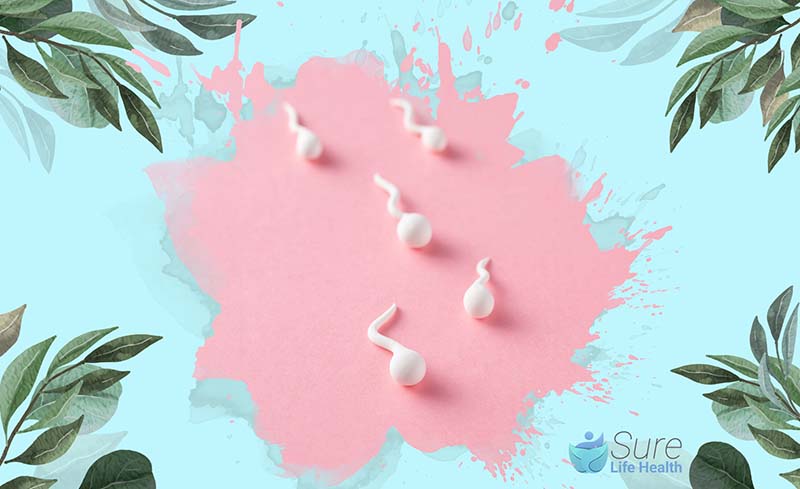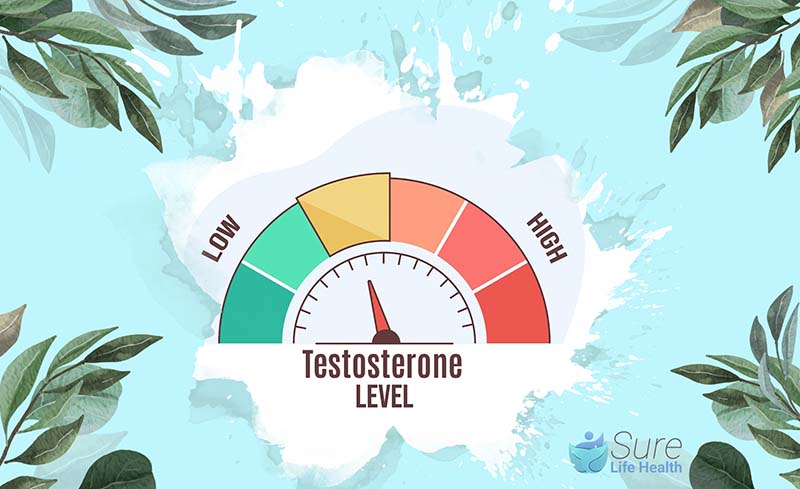Many people find pleasure and stress relief in masturbation. However, misunderstandings persist about its impact on sexual health, especially regarding its effect on sperm count.
“Does masturbation cause low sperm count?” is a key question that arises in this context. Sperm count is crucial for male fertility, and if it decreases, it can make it harder to conceive.
So, it’s important to know if masturbation really impacts sperm count in a negative way. In this discussion, we’ll explore whether masturbation affects sperm count and look at the scientific evidence behind it.
Can Masturbation Cause Low Sperm Count?
Contrary to common beliefs, masturbation doesn’t significantly reduce sperm count or quality, according to Dr. David Shusterman, a certified urologist. In fact, he suggests that masturbating and ejaculating may even enhance sperm count and quality.
Unlike individuals assigned female at birth who have a fixed number of eggs, those assigned male at birth continuously produce sperm. The process, called spermatogenesis, takes around 42 to 76 days. After production, unused sperm can remain in the epididymis (a coiled tube connected to each testicle) for a few weeks before being reabsorbed by the body. However, sperm that have been stored for too long tend to have reduced motility and quality compared to newly produced ones.
2022 research in Frontiers in Endocrinology found that sperm quality may begin to deteriorate after seven days. Furthermore, a 2017 study indicates that sexual abstinence, like NoFap, could reduce sperm quality.
Dr. Shusterman emphasizes that ejaculating, whether through solo or partnered sex, helps clear out older sperm, making space for newer, higher-quality ones. Therefore, frequent ejaculation is essential for ensuring that the fresher sperm have room to thrive, as they generally exhibit better motility and quality.
If you and your partner are trying to conceive, masturbating shouldn’t hinder your chances. Dr. Shusterman points out that factors like medication, age, and stress have a much more significant impact on sperm quality and quantity than masturbation does.

Why Should Men Masturbate?
Far from being merely neutral, masturbation offers numerous health and well-being benefits for men. According to Carol Queen, Ph.D., a sexologist and sociologist, as well as a sex educator, solo sex can provide relief from pain, improve circulation, elevate mood, alleviate symptoms of depression and anxiety, and promote better sleep.
Moreover, reaching ejaculation through masturbation can support prostate health. Research published in the journal European Urology indicates that men who ejaculate 21 or more times per month have a lower risk of prostate cancer compared to those who ejaculate 7 times or less. This finding suggests that individuals with penises should aim for at least 21 ejaculations per month.
Additionally, regular masturbation can help maintain erectile function. As explained by Forcier, the penis operates on a “use it or lose it” principle. In other words, insufficient use can lead to decreased performance, while excessive use can result in fatigue or desensitization. Finding the right balance is key to optimal erectile function.
Furthermore, masturbation engages pelvic floor muscles, which are vital for achieving strong erections. Strengthening these muscles through masturbation contributes to overall sexual health.
On a mental health level, masturbation offers benefits as well. Queen emphasizes that the act of masturbation and the release of feel-good chemicals during orgasm can uplift mood and reduce stress. Overall, masturbating isn’t just a pleasurable activity—it’s also a way to promote physical and mental well-being.

How to Maintain Healthy Sperm Despite Masturbation
To maintain healthy sperm despite masturbation, consider the following tips:
Avoid Masturbating Too Much
While masturbation is natural and normal, excessive indulgence can negatively impact sperm count and reproductive health. Aim for a balanced approach and avoid compulsive or overly frequent behavior.
Engage in Regular Physical Activity
Engaging in regular physical activity not only boosts overall health but also supports healthy sperm production. Strive for at least 30 minutes of exercise most days of the week.

Limit Alcohol Consumption and Quit Smoking
Excessive alcohol consumption and smoking have been linked to reduced sperm count and quality. Limiting alcohol intake and quitting smoking can significantly improve reproductive health.

Maintain A Healthy and Balanced Diet
A healthy and balanced diet plays a crucial role in supporting optimal sperm production. Ensure your diet includes plenty of fruits, vegetables, whole grains, and lean proteins to provide essential nutrients for healthy sperm.
Seek Help If Necessary
If you notice any adverse effects on your reproductive health, such as a decline in sperm count, don’t hesitate to seek advice from a medical professional. They can identify underlying issues and offer appropriate treatment options.
By following these guidelines, you can maintain healthy sperm levels while enjoying the benefits of masturbation. Remember to prioritize your overall well-being for optimal reproductive health.
How Long Does It Take for the Body to Produce New Sperm?
The body typically takes about 64 to 74 days to generate new sperm cells through a process called spermatogenesis.
This ongoing process occurs within the testicles, where millions of sperm are produced daily. Sperm undergo various stages of maturation, starting from the seminiferous tubules in the testicles, progressing to further maturation in the epididymis, until they become fully developed sperm cells.
Overall, the complete cycle of sperm production and maturation spans approximately 64 to 74 days, ensuring a steady stream of fresh sperm available for conception.
Does Masturbation Decrease Testosterone?
The notion that masturbation reduces testosterone levels or has a negative impact on testes size is simply unfounded, much like the myth that solo sex diminishes muscle gains at the gym.
Testosterone levels are primarily regulated by the pituitary gland, a small gland in the brain that is part of the endocrine system. According to Shusterman, factors such as body weight, diet, stress levels, sleep quality and quantity, and substance use can influence the amount of testosterone produced by this gland. However, he emphasizes that overall testosterone levels are not affected by the temporary fluctuations that occur immediately after ejaculation.
Furthermore, there is no scientific evidence to suggest that masturbation affects the size, growth, or shrinkage of the testes. Shusterman clarifies that the size of the testicles is mainly determined by genetics, hormone levels during puberty, and overall health. Therefore, individuals need not worry about masturbation negatively impacting testosterone levels or testes size.

Masturbation and Infertility: Is There a Link?
There is no direct correlation between masturbation and infertility. Masturbation is a natural and normal sexual activity that does not harm the reproductive system or contribute to infertility.
It’s crucial to understand that infertility can stem from various factors, including hormonal imbalances, genetic factors, or physical abnormalities. While masturbation itself is not a cause of infertility, maintaining a healthy balance in sexual habits is essential.
If you’re experiencing any adverse effects related to masturbation or are facing challenges with infertility, it’s advisable to seek assistance from a medical professional. They can help identify any underlying issues and provide appropriate guidance and treatment options tailored to your specific needs.
Conclusion
In conclusion, the question “Does Masturbation Cause Low Sperm Count?” is one surrounded by myths and misconceptions. However, scientific evidence and expert testimony have clearly shown that masturbation does not negatively impact sperm count or fertility.
Instead, it offers numerous health benefits, including improved mental health, a reduced risk of prostate cancer, and better sexual well-being. Embracing masturbation as a healthy, natural part of sexual life can lead to improved physical and emotional health.
For anyone concerned about fertility or simply looking to maintain a healthy lifestyle, masturbation should be seen not just as a source of pleasure but as a positive aspect of overall well-being.
Be sure to explore more insightful blogs from Sure Life Health, where we continue to shed light on the latest trends and breakthroughs in health and wellness.
Professor Gaye Cunnane, PhD, MB, FRCPI
As the Director of Health and Wellbeing at RCPI, Professor Gaye Cunnane is at the helm of initiatives aimed at enhancing the health and well-being of RCPI Trainers and Trainees. Her role extends beyond administration; she is also a respected clinical professor of rheumatology and a consultant rheumatologist at Trinity College Dublin (TCD) and St James’s Hospital. Prof. Cunnane’s medical journey began at TCD, where she graduated from medical school, and her path has been marked by both clinical and academic excellence.
After completing her basic clinical training in medicine, she embarked on PhD studies at University College Dublin and St Vincent’s University Hospital. Her research during this period was focused on prognostic markers in early inflammatory arthritis, a project that saw her collaborating with esteemed universities across Europe, including in Switzerland, The Netherlands, the UK, and Sweden.
Prof. Cunnane’s career took her to the University of California, San Francisco, where she spent three years delving into research on new treatments for lupus. Her academic prowess led her to the University of Leeds in 2001 as a senior lecturer, before returning to Ireland in 2003 to assume her current roles. She has also served as the National Specialty Director for Rheumatology training in Ireland, Programme Director for Basic Specialist Training with RCPI, and as a past President of the Irish Society for Rheumatology.
PUBLISHED ARTICLES
“Rheumatic disease differentiation using immunoglobulin G sugar printing by high-density electrophoresis”: Published in The Journal of Rheumatology, this study reflects her in-depth investigation into rheumatic diseases.
“Benefits of exercise in patients with rheumatoid arthritis: a randomized controlled trial”: This research work, highlighting the positive impact of exercise on rheumatoid arthritis, underscores Prof. Cunnane’s dedication to practical, patient-centered research.
Additionally, Prof. Cunnane has made notable contributions to the Annals of the Rheumatic Diseases, discussing early referral, diagnosis, and treatment of rheumatoid arthritis. She has also been involved in a study on the NCBI platform investigating exercise benefits in rheumatoid arthritis patients.
Professor Gaye Cunnane’s career is a testament to her commitment to improving patient outcomes in rheumatology through rigorous research, clinical excellence, and dedicated teaching. Her work continues to influence the field of rheumatology, both in Ireland and internationally.

